King's College Hospital and AI: Applications, Challenges, and Impacts
VerifiedAdded on 2022/12/28
|10
|3123
|28
Report
AI Summary
This report provides a comprehensive analysis of the role of Artificial Intelligence (AI) in healthcare, focusing on its capabilities, applications, advantages, and challenges. The report begins with an introduction to healthcare informatics and the use of AI, and then delves into the capabilities of AI, including its ability to process information and learn from experience. It explores various applications of AI in healthcare, such as disease detection, robotic surgeries, and drug discovery, and highlights the advantages of AI in improving patient care and reducing medical errors. The report also addresses the barriers to adopting AI, including high costs, lack of skills, and privacy concerns. Furthermore, it examines the impact of AI on healthcare delivery, discussing its positive effects on efficiency and patient experience. The report then presents a case study of King's College Hospital NHS Foundation Trust, analyzing the ethical, social, and legal challenges associated with AI implementation within the hospital. The ethical challenges include privacy violations and ethical dilemmas faced by healthcare professionals. The social challenges include issues of cost and the loss of personal touch in treatments. The legal challenges include issues related to patient data and informed consent. The report concludes with an evaluation of the challenges that AI presents for both patients and clinicians.
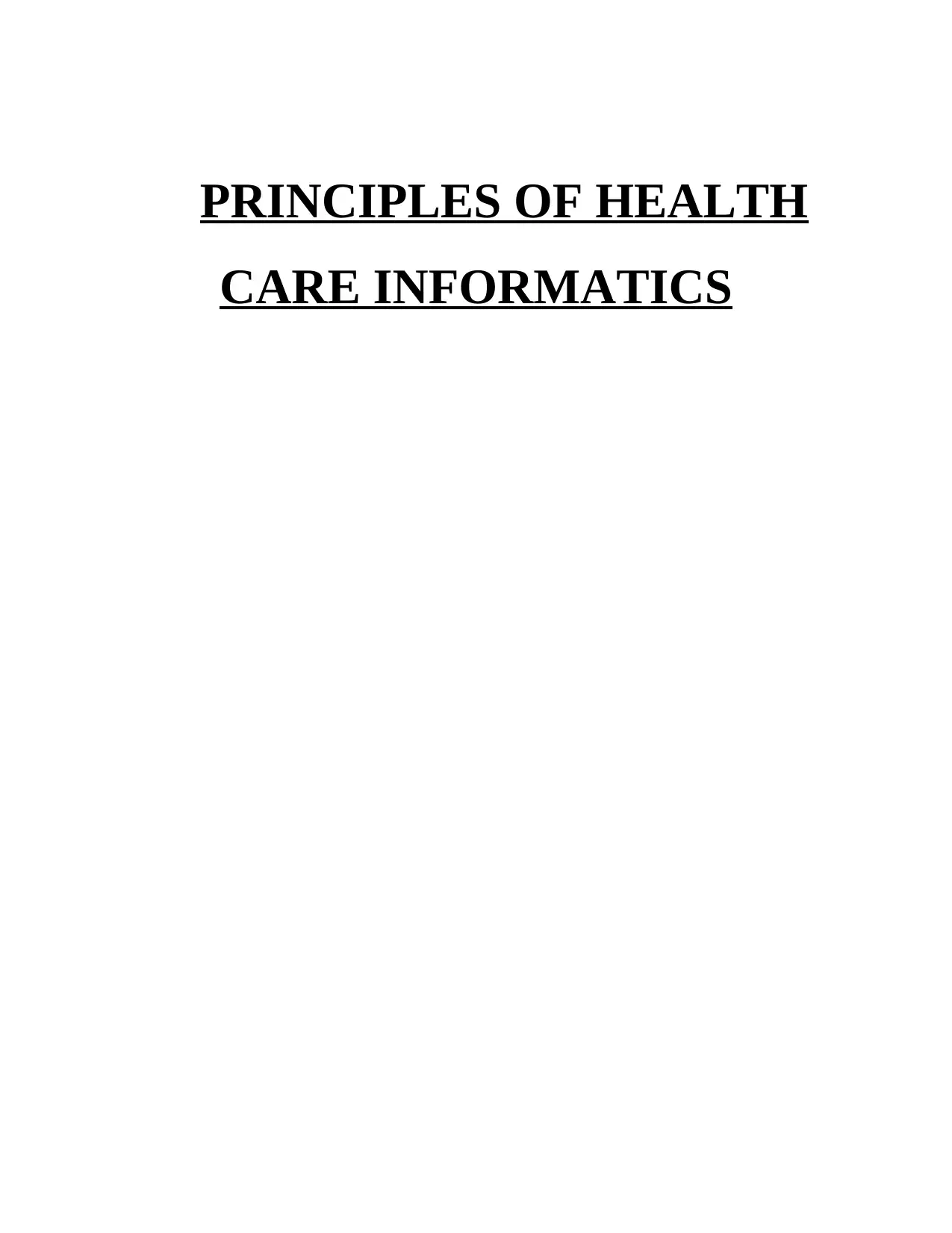
PRINCIPLES OF HEALTH
CARE INFORMATICS
CARE INFORMATICS
Paraphrase This Document
Need a fresh take? Get an instant paraphrase of this document with our AI Paraphraser
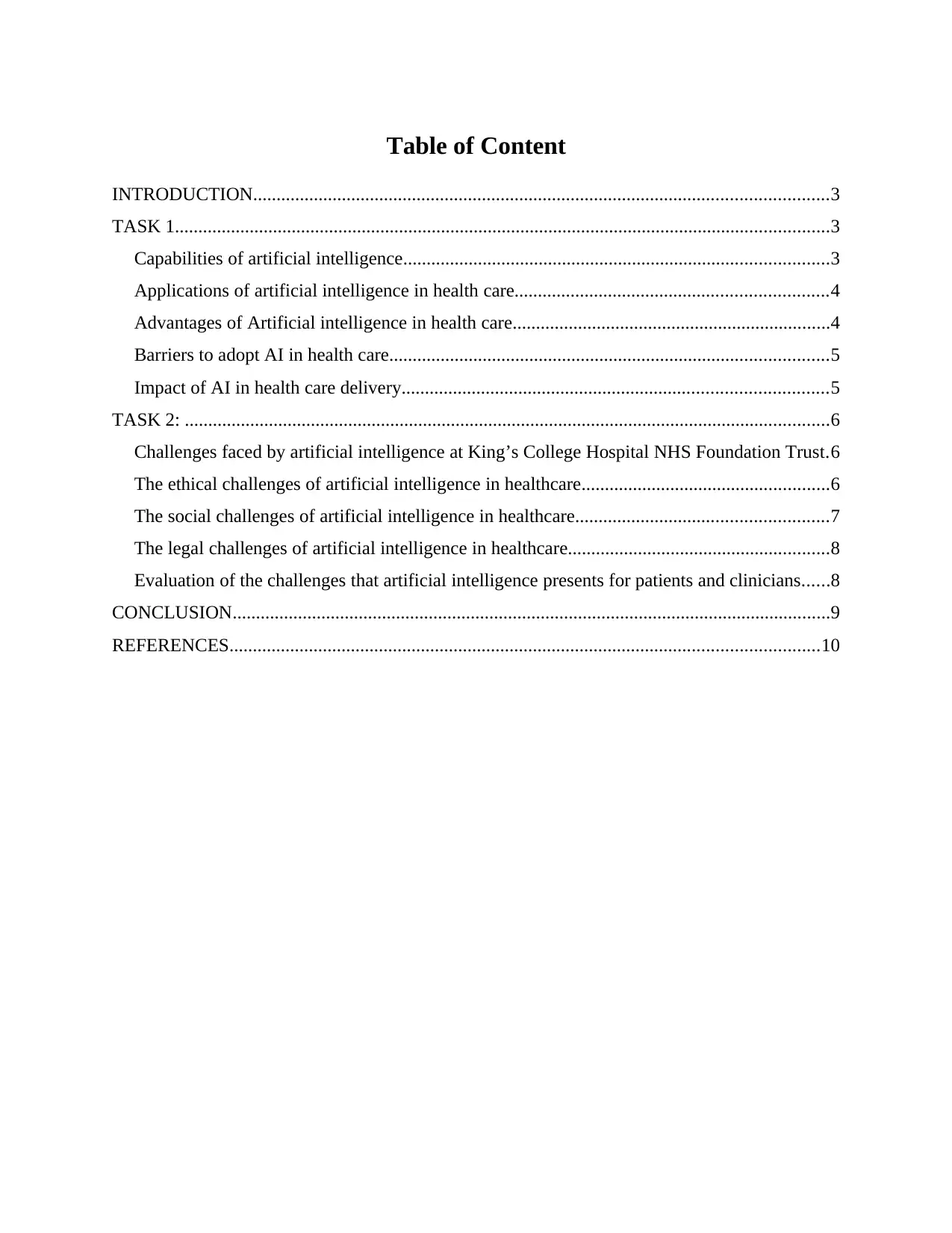
Table of Content
INTRODUCTION...........................................................................................................................3
TASK 1............................................................................................................................................3
Capabilities of artificial intelligence...........................................................................................3
Applications of artificial intelligence in health care...................................................................4
Advantages of Artificial intelligence in health care....................................................................4
Barriers to adopt AI in health care..............................................................................................5
Impact of AI in health care delivery...........................................................................................5
TASK 2: ..........................................................................................................................................6
Challenges faced by artificial intelligence at King’s College Hospital NHS Foundation Trust.6
The ethical challenges of artificial intelligence in healthcare.....................................................6
The social challenges of artificial intelligence in healthcare......................................................7
The legal challenges of artificial intelligence in healthcare........................................................8
Evaluation of the challenges that artificial intelligence presents for patients and clinicians......8
CONCLUSION................................................................................................................................9
REFERENCES..............................................................................................................................10
INTRODUCTION...........................................................................................................................3
TASK 1............................................................................................................................................3
Capabilities of artificial intelligence...........................................................................................3
Applications of artificial intelligence in health care...................................................................4
Advantages of Artificial intelligence in health care....................................................................4
Barriers to adopt AI in health care..............................................................................................5
Impact of AI in health care delivery...........................................................................................5
TASK 2: ..........................................................................................................................................6
Challenges faced by artificial intelligence at King’s College Hospital NHS Foundation Trust.6
The ethical challenges of artificial intelligence in healthcare.....................................................6
The social challenges of artificial intelligence in healthcare......................................................7
The legal challenges of artificial intelligence in healthcare........................................................8
Evaluation of the challenges that artificial intelligence presents for patients and clinicians......8
CONCLUSION................................................................................................................................9
REFERENCES..............................................................................................................................10
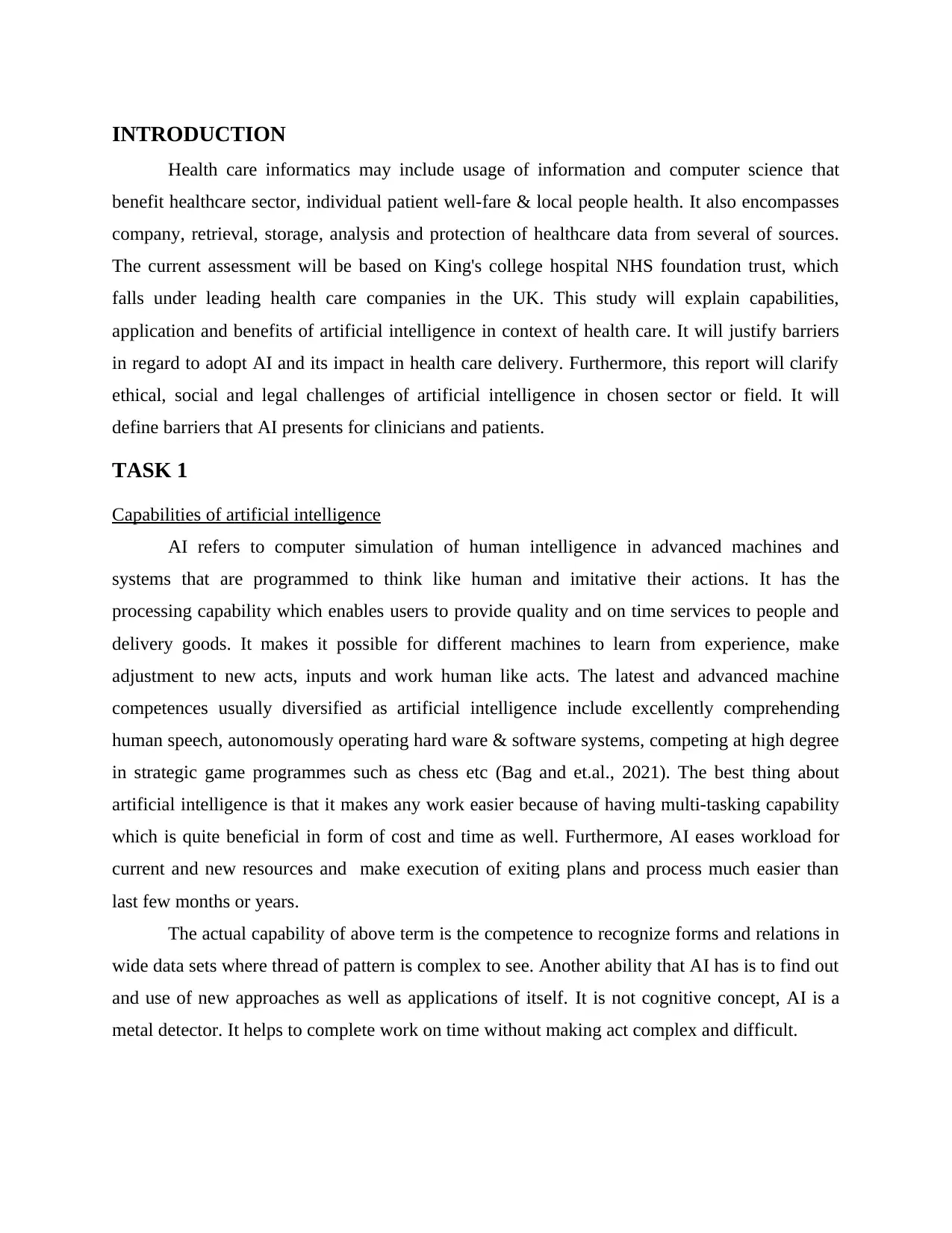
INTRODUCTION
Health care informatics may include usage of information and computer science that
benefit healthcare sector, individual patient well-fare & local people health. It also encompasses
company, retrieval, storage, analysis and protection of healthcare data from several of sources.
The current assessment will be based on King's college hospital NHS foundation trust, which
falls under leading health care companies in the UK. This study will explain capabilities,
application and benefits of artificial intelligence in context of health care. It will justify barriers
in regard to adopt AI and its impact in health care delivery. Furthermore, this report will clarify
ethical, social and legal challenges of artificial intelligence in chosen sector or field. It will
define barriers that AI presents for clinicians and patients.
TASK 1
Capabilities of artificial intelligence
AI refers to computer simulation of human intelligence in advanced machines and
systems that are programmed to think like human and imitative their actions. It has the
processing capability which enables users to provide quality and on time services to people and
delivery goods. It makes it possible for different machines to learn from experience, make
adjustment to new acts, inputs and work human like acts. The latest and advanced machine
competences usually diversified as artificial intelligence include excellently comprehending
human speech, autonomously operating hard ware & software systems, competing at high degree
in strategic game programmes such as chess etc (Bag and et.al., 2021). The best thing about
artificial intelligence is that it makes any work easier because of having multi-tasking capability
which is quite beneficial in form of cost and time as well. Furthermore, AI eases workload for
current and new resources and make execution of exiting plans and process much easier than
last few months or years.
The actual capability of above term is the competence to recognize forms and relations in
wide data sets where thread of pattern is complex to see. Another ability that AI has is to find out
and use of new approaches as well as applications of itself. It is not cognitive concept, AI is a
metal detector. It helps to complete work on time without making act complex and difficult.
Health care informatics may include usage of information and computer science that
benefit healthcare sector, individual patient well-fare & local people health. It also encompasses
company, retrieval, storage, analysis and protection of healthcare data from several of sources.
The current assessment will be based on King's college hospital NHS foundation trust, which
falls under leading health care companies in the UK. This study will explain capabilities,
application and benefits of artificial intelligence in context of health care. It will justify barriers
in regard to adopt AI and its impact in health care delivery. Furthermore, this report will clarify
ethical, social and legal challenges of artificial intelligence in chosen sector or field. It will
define barriers that AI presents for clinicians and patients.
TASK 1
Capabilities of artificial intelligence
AI refers to computer simulation of human intelligence in advanced machines and
systems that are programmed to think like human and imitative their actions. It has the
processing capability which enables users to provide quality and on time services to people and
delivery goods. It makes it possible for different machines to learn from experience, make
adjustment to new acts, inputs and work human like acts. The latest and advanced machine
competences usually diversified as artificial intelligence include excellently comprehending
human speech, autonomously operating hard ware & software systems, competing at high degree
in strategic game programmes such as chess etc (Bag and et.al., 2021). The best thing about
artificial intelligence is that it makes any work easier because of having multi-tasking capability
which is quite beneficial in form of cost and time as well. Furthermore, AI eases workload for
current and new resources and make execution of exiting plans and process much easier than
last few months or years.
The actual capability of above term is the competence to recognize forms and relations in
wide data sets where thread of pattern is complex to see. Another ability that AI has is to find out
and use of new approaches as well as applications of itself. It is not cognitive concept, AI is a
metal detector. It helps to complete work on time without making act complex and difficult.
⊘ This is a preview!⊘
Do you want full access?
Subscribe today to unlock all pages.

Trusted by 1+ million students worldwide
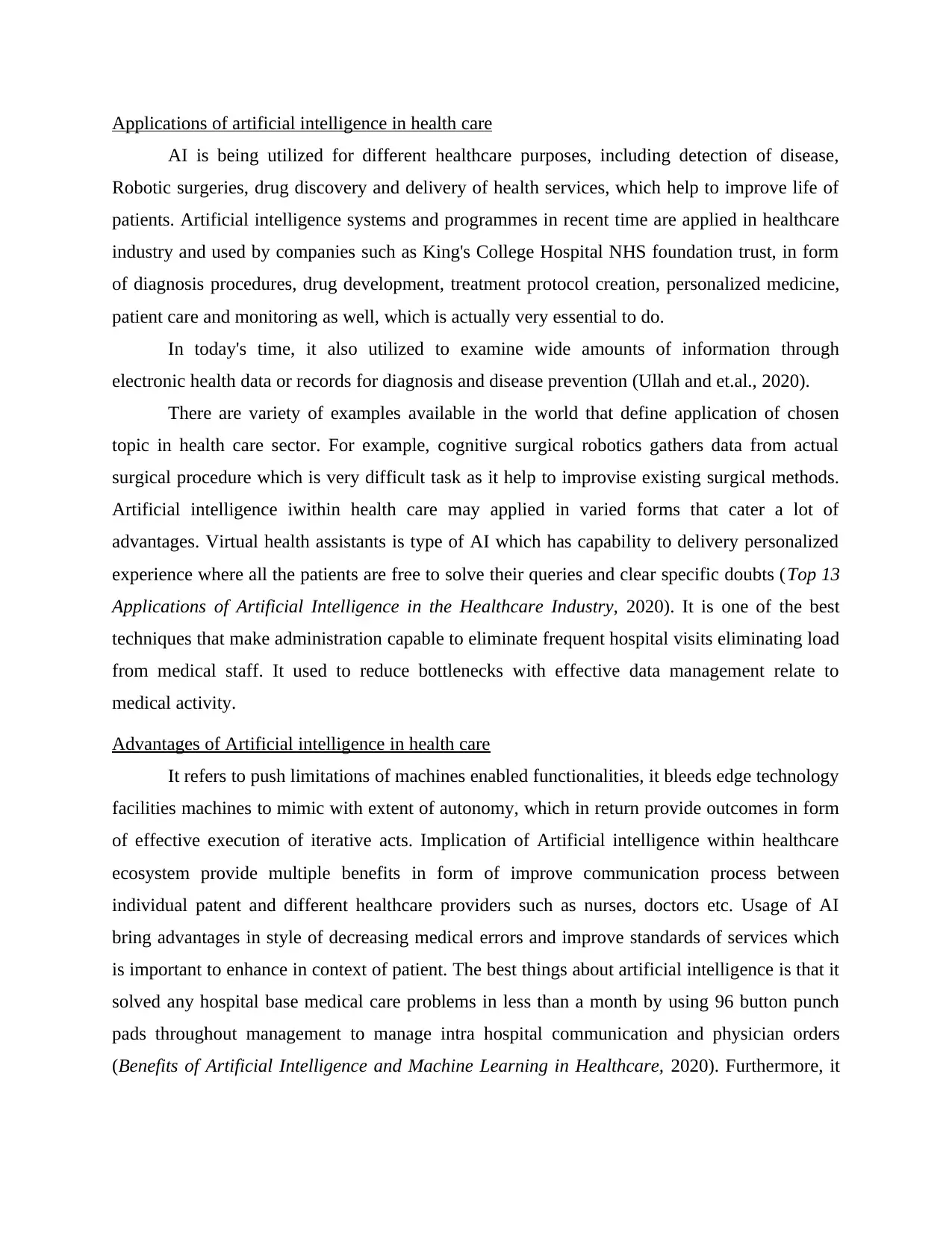
Applications of artificial intelligence in health care
AI is being utilized for different healthcare purposes, including detection of disease,
Robotic surgeries, drug discovery and delivery of health services, which help to improve life of
patients. Artificial intelligence systems and programmes in recent time are applied in healthcare
industry and used by companies such as King's College Hospital NHS foundation trust, in form
of diagnosis procedures, drug development, treatment protocol creation, personalized medicine,
patient care and monitoring as well, which is actually very essential to do.
In today's time, it also utilized to examine wide amounts of information through
electronic health data or records for diagnosis and disease prevention (Ullah and et.al., 2020).
There are variety of examples available in the world that define application of chosen
topic in health care sector. For example, cognitive surgical robotics gathers data from actual
surgical procedure which is very difficult task as it help to improvise existing surgical methods.
Artificial intelligence iwithin health care may applied in varied forms that cater a lot of
advantages. Virtual health assistants is type of AI which has capability to delivery personalized
experience where all the patients are free to solve their queries and clear specific doubts (Top 13
Applications of Artificial Intelligence in the Healthcare Industry, 2020). It is one of the best
techniques that make administration capable to eliminate frequent hospital visits eliminating load
from medical staff. It used to reduce bottlenecks with effective data management relate to
medical activity.
Advantages of Artificial intelligence in health care
It refers to push limitations of machines enabled functionalities, it bleeds edge technology
facilities machines to mimic with extent of autonomy, which in return provide outcomes in form
of effective execution of iterative acts. Implication of Artificial intelligence within healthcare
ecosystem provide multiple benefits in form of improve communication process between
individual patent and different healthcare providers such as nurses, doctors etc. Usage of AI
bring advantages in style of decreasing medical errors and improve standards of services which
is important to enhance in context of patient. The best things about artificial intelligence is that it
solved any hospital base medical care problems in less than a month by using 96 button punch
pads throughout management to manage intra hospital communication and physician orders
(Benefits of Artificial Intelligence and Machine Learning in Healthcare, 2020). Furthermore, it
AI is being utilized for different healthcare purposes, including detection of disease,
Robotic surgeries, drug discovery and delivery of health services, which help to improve life of
patients. Artificial intelligence systems and programmes in recent time are applied in healthcare
industry and used by companies such as King's College Hospital NHS foundation trust, in form
of diagnosis procedures, drug development, treatment protocol creation, personalized medicine,
patient care and monitoring as well, which is actually very essential to do.
In today's time, it also utilized to examine wide amounts of information through
electronic health data or records for diagnosis and disease prevention (Ullah and et.al., 2020).
There are variety of examples available in the world that define application of chosen
topic in health care sector. For example, cognitive surgical robotics gathers data from actual
surgical procedure which is very difficult task as it help to improvise existing surgical methods.
Artificial intelligence iwithin health care may applied in varied forms that cater a lot of
advantages. Virtual health assistants is type of AI which has capability to delivery personalized
experience where all the patients are free to solve their queries and clear specific doubts (Top 13
Applications of Artificial Intelligence in the Healthcare Industry, 2020). It is one of the best
techniques that make administration capable to eliminate frequent hospital visits eliminating load
from medical staff. It used to reduce bottlenecks with effective data management relate to
medical activity.
Advantages of Artificial intelligence in health care
It refers to push limitations of machines enabled functionalities, it bleeds edge technology
facilities machines to mimic with extent of autonomy, which in return provide outcomes in form
of effective execution of iterative acts. Implication of Artificial intelligence within healthcare
ecosystem provide multiple benefits in form of improve communication process between
individual patent and different healthcare providers such as nurses, doctors etc. Usage of AI
bring advantages in style of decreasing medical errors and improve standards of services which
is important to enhance in context of patient. The best things about artificial intelligence is that it
solved any hospital base medical care problems in less than a month by using 96 button punch
pads throughout management to manage intra hospital communication and physician orders
(Benefits of Artificial Intelligence and Machine Learning in Healthcare, 2020). Furthermore, it
Paraphrase This Document
Need a fresh take? Get an instant paraphrase of this document with our AI Paraphraser
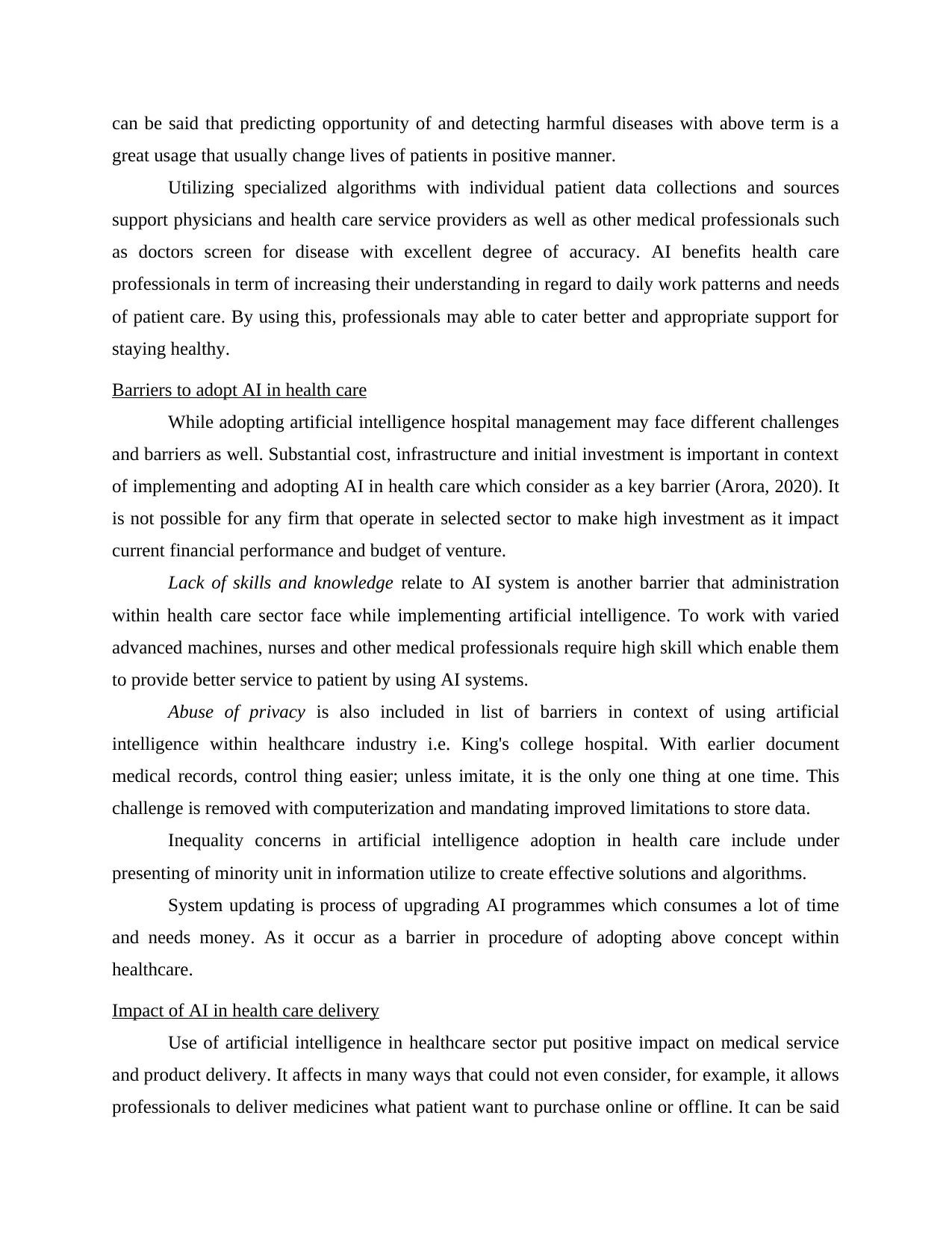
can be said that predicting opportunity of and detecting harmful diseases with above term is a
great usage that usually change lives of patients in positive manner.
Utilizing specialized algorithms with individual patient data collections and sources
support physicians and health care service providers as well as other medical professionals such
as doctors screen for disease with excellent degree of accuracy. AI benefits health care
professionals in term of increasing their understanding in regard to daily work patterns and needs
of patient care. By using this, professionals may able to cater better and appropriate support for
staying healthy.
Barriers to adopt AI in health care
While adopting artificial intelligence hospital management may face different challenges
and barriers as well. Substantial cost, infrastructure and initial investment is important in context
of implementing and adopting AI in health care which consider as a key barrier (Arora, 2020). It
is not possible for any firm that operate in selected sector to make high investment as it impact
current financial performance and budget of venture.
Lack of skills and knowledge relate to AI system is another barrier that administration
within health care sector face while implementing artificial intelligence. To work with varied
advanced machines, nurses and other medical professionals require high skill which enable them
to provide better service to patient by using AI systems.
Abuse of privacy is also included in list of barriers in context of using artificial
intelligence within healthcare industry i.e. King's college hospital. With earlier document
medical records, control thing easier; unless imitate, it is the only one thing at one time. This
challenge is removed with computerization and mandating improved limitations to store data.
Inequality concerns in artificial intelligence adoption in health care include under
presenting of minority unit in information utilize to create effective solutions and algorithms.
System updating is process of upgrading AI programmes which consumes a lot of time
and needs money. As it occur as a barrier in procedure of adopting above concept within
healthcare.
Impact of AI in health care delivery
Use of artificial intelligence in healthcare sector put positive impact on medical service
and product delivery. It affects in many ways that could not even consider, for example, it allows
professionals to deliver medicines what patient want to purchase online or offline. It can be said
great usage that usually change lives of patients in positive manner.
Utilizing specialized algorithms with individual patient data collections and sources
support physicians and health care service providers as well as other medical professionals such
as doctors screen for disease with excellent degree of accuracy. AI benefits health care
professionals in term of increasing their understanding in regard to daily work patterns and needs
of patient care. By using this, professionals may able to cater better and appropriate support for
staying healthy.
Barriers to adopt AI in health care
While adopting artificial intelligence hospital management may face different challenges
and barriers as well. Substantial cost, infrastructure and initial investment is important in context
of implementing and adopting AI in health care which consider as a key barrier (Arora, 2020). It
is not possible for any firm that operate in selected sector to make high investment as it impact
current financial performance and budget of venture.
Lack of skills and knowledge relate to AI system is another barrier that administration
within health care sector face while implementing artificial intelligence. To work with varied
advanced machines, nurses and other medical professionals require high skill which enable them
to provide better service to patient by using AI systems.
Abuse of privacy is also included in list of barriers in context of using artificial
intelligence within healthcare industry i.e. King's college hospital. With earlier document
medical records, control thing easier; unless imitate, it is the only one thing at one time. This
challenge is removed with computerization and mandating improved limitations to store data.
Inequality concerns in artificial intelligence adoption in health care include under
presenting of minority unit in information utilize to create effective solutions and algorithms.
System updating is process of upgrading AI programmes which consumes a lot of time
and needs money. As it occur as a barrier in procedure of adopting above concept within
healthcare.
Impact of AI in health care delivery
Use of artificial intelligence in healthcare sector put positive impact on medical service
and product delivery. It affects in many ways that could not even consider, for example, it allows
professionals to deliver medicines what patient want to purchase online or offline. It can be said
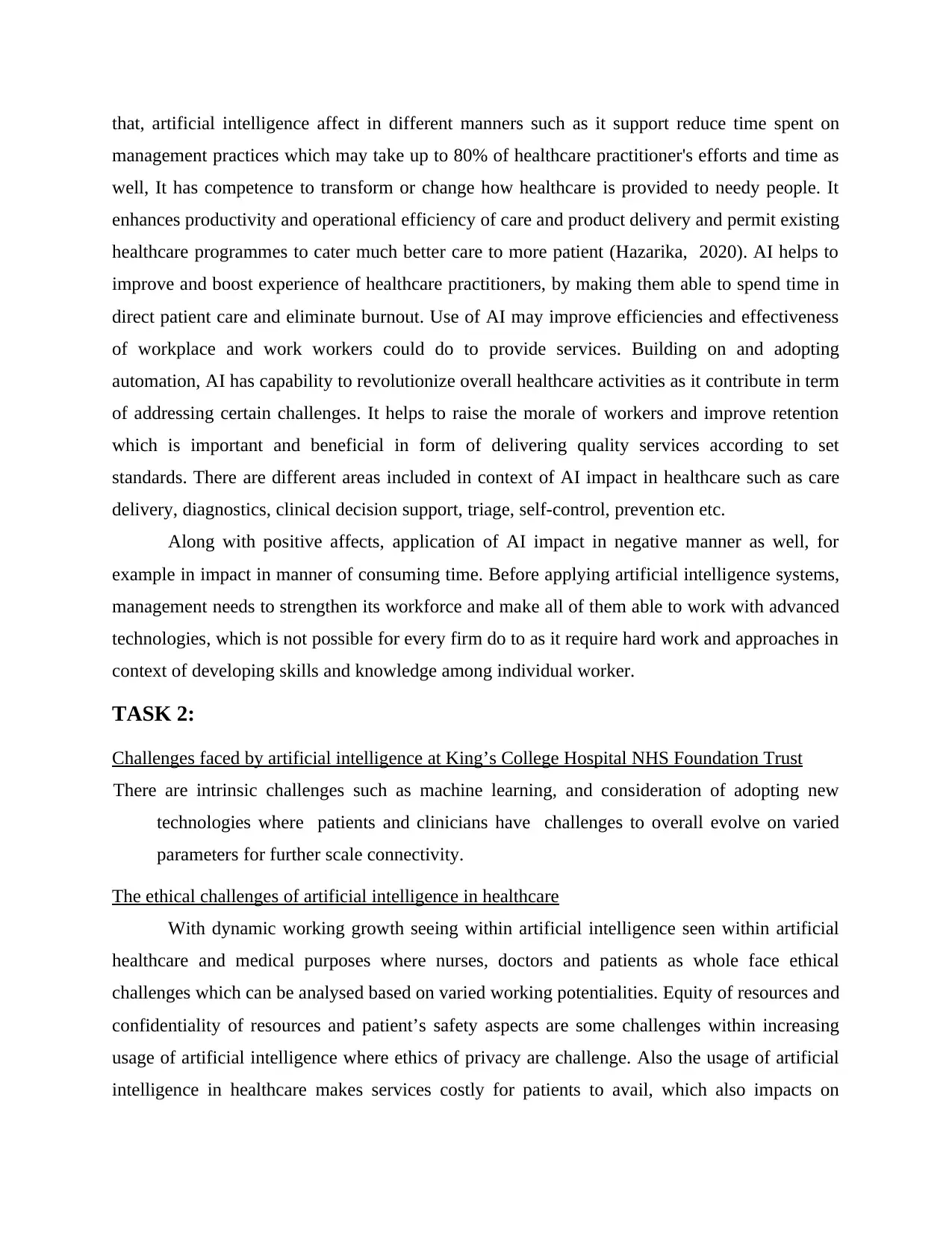
that, artificial intelligence affect in different manners such as it support reduce time spent on
management practices which may take up to 80% of healthcare practitioner's efforts and time as
well, It has competence to transform or change how healthcare is provided to needy people. It
enhances productivity and operational efficiency of care and product delivery and permit existing
healthcare programmes to cater much better care to more patient (Hazarika, 2020). AI helps to
improve and boost experience of healthcare practitioners, by making them able to spend time in
direct patient care and eliminate burnout. Use of AI may improve efficiencies and effectiveness
of workplace and work workers could do to provide services. Building on and adopting
automation, AI has capability to revolutionize overall healthcare activities as it contribute in term
of addressing certain challenges. It helps to raise the morale of workers and improve retention
which is important and beneficial in form of delivering quality services according to set
standards. There are different areas included in context of AI impact in healthcare such as care
delivery, diagnostics, clinical decision support, triage, self-control, prevention etc.
Along with positive affects, application of AI impact in negative manner as well, for
example in impact in manner of consuming time. Before applying artificial intelligence systems,
management needs to strengthen its workforce and make all of them able to work with advanced
technologies, which is not possible for every firm do to as it require hard work and approaches in
context of developing skills and knowledge among individual worker.
TASK 2:
Challenges faced by artificial intelligence at King’s College Hospital NHS Foundation Trust
There are intrinsic challenges such as machine learning, and consideration of adopting new
technologies where patients and clinicians have challenges to overall evolve on varied
parameters for further scale connectivity.
The ethical challenges of artificial intelligence in healthcare
With dynamic working growth seeing within artificial intelligence seen within artificial
healthcare and medical purposes where nurses, doctors and patients as whole face ethical
challenges which can be analysed based on varied working potentialities. Equity of resources and
confidentiality of resources and patient’s safety aspects are some challenges within increasing
usage of artificial intelligence where ethics of privacy are challenge. Also the usage of artificial
intelligence in healthcare makes services costly for patients to avail, which also impacts on
management practices which may take up to 80% of healthcare practitioner's efforts and time as
well, It has competence to transform or change how healthcare is provided to needy people. It
enhances productivity and operational efficiency of care and product delivery and permit existing
healthcare programmes to cater much better care to more patient (Hazarika, 2020). AI helps to
improve and boost experience of healthcare practitioners, by making them able to spend time in
direct patient care and eliminate burnout. Use of AI may improve efficiencies and effectiveness
of workplace and work workers could do to provide services. Building on and adopting
automation, AI has capability to revolutionize overall healthcare activities as it contribute in term
of addressing certain challenges. It helps to raise the morale of workers and improve retention
which is important and beneficial in form of delivering quality services according to set
standards. There are different areas included in context of AI impact in healthcare such as care
delivery, diagnostics, clinical decision support, triage, self-control, prevention etc.
Along with positive affects, application of AI impact in negative manner as well, for
example in impact in manner of consuming time. Before applying artificial intelligence systems,
management needs to strengthen its workforce and make all of them able to work with advanced
technologies, which is not possible for every firm do to as it require hard work and approaches in
context of developing skills and knowledge among individual worker.
TASK 2:
Challenges faced by artificial intelligence at King’s College Hospital NHS Foundation Trust
There are intrinsic challenges such as machine learning, and consideration of adopting new
technologies where patients and clinicians have challenges to overall evolve on varied
parameters for further scale connectivity.
The ethical challenges of artificial intelligence in healthcare
With dynamic working growth seeing within artificial intelligence seen within artificial
healthcare and medical purposes where nurses, doctors and patients as whole face ethical
challenges which can be analysed based on varied working potentialities. Equity of resources and
confidentiality of resources and patient’s safety aspects are some challenges within increasing
usage of artificial intelligence where ethics of privacy are challenge. Also the usage of artificial
intelligence in healthcare makes services costly for patients to avail, which also impacts on
⊘ This is a preview!⊘
Do you want full access?
Subscribe today to unlock all pages.

Trusted by 1+ million students worldwide
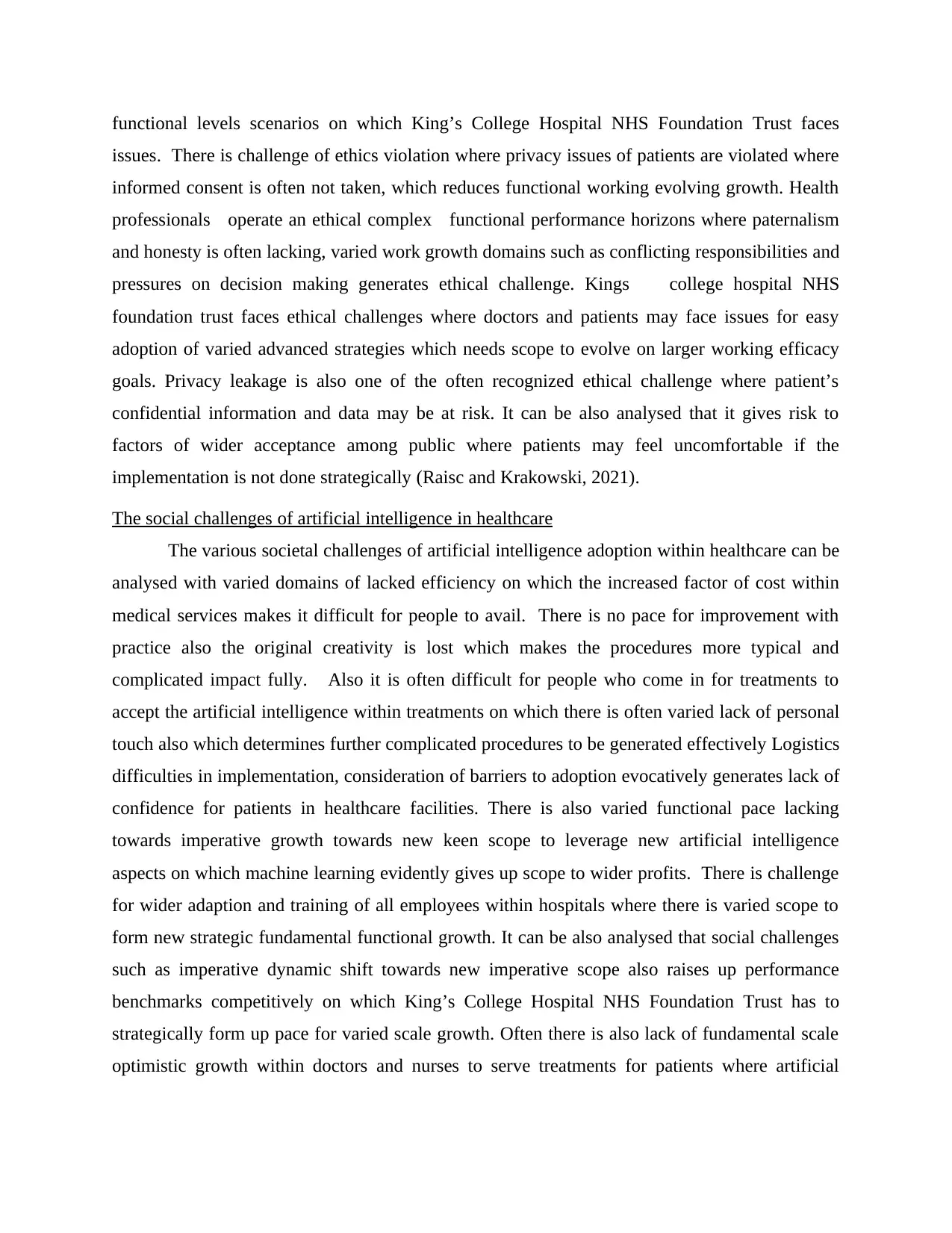
functional levels scenarios on which King’s College Hospital NHS Foundation Trust faces
issues. There is challenge of ethics violation where privacy issues of patients are violated where
informed consent is often not taken, which reduces functional working evolving growth. Health
professionals operate an ethical complex functional performance horizons where paternalism
and honesty is often lacking, varied work growth domains such as conflicting responsibilities and
pressures on decision making generates ethical challenge. Kings college hospital NHS
foundation trust faces ethical challenges where doctors and patients may face issues for easy
adoption of varied advanced strategies which needs scope to evolve on larger working efficacy
goals. Privacy leakage is also one of the often recognized ethical challenge where patient’s
confidential information and data may be at risk. It can be also analysed that it gives risk to
factors of wider acceptance among public where patients may feel uncomfortable if the
implementation is not done strategically (Raisc and Krakowski, 2021).
The social challenges of artificial intelligence in healthcare
The various societal challenges of artificial intelligence adoption within healthcare can be
analysed with varied domains of lacked efficiency on which the increased factor of cost within
medical services makes it difficult for people to avail. There is no pace for improvement with
practice also the original creativity is lost which makes the procedures more typical and
complicated impact fully. Also it is often difficult for people who come in for treatments to
accept the artificial intelligence within treatments on which there is often varied lack of personal
touch also which determines further complicated procedures to be generated effectively Logistics
difficulties in implementation, consideration of barriers to adoption evocatively generates lack of
confidence for patients in healthcare facilities. There is also varied functional pace lacking
towards imperative growth towards new keen scope to leverage new artificial intelligence
aspects on which machine learning evidently gives up scope to wider profits. There is challenge
for wider adaption and training of all employees within hospitals where there is varied scope to
form new strategic fundamental functional growth. It can be also analysed that social challenges
such as imperative dynamic shift towards new imperative scope also raises up performance
benchmarks competitively on which King’s College Hospital NHS Foundation Trust has to
strategically form up pace for varied scale growth. Often there is also lack of fundamental scale
optimistic growth within doctors and nurses to serve treatments for patients where artificial
issues. There is challenge of ethics violation where privacy issues of patients are violated where
informed consent is often not taken, which reduces functional working evolving growth. Health
professionals operate an ethical complex functional performance horizons where paternalism
and honesty is often lacking, varied work growth domains such as conflicting responsibilities and
pressures on decision making generates ethical challenge. Kings college hospital NHS
foundation trust faces ethical challenges where doctors and patients may face issues for easy
adoption of varied advanced strategies which needs scope to evolve on larger working efficacy
goals. Privacy leakage is also one of the often recognized ethical challenge where patient’s
confidential information and data may be at risk. It can be also analysed that it gives risk to
factors of wider acceptance among public where patients may feel uncomfortable if the
implementation is not done strategically (Raisc and Krakowski, 2021).
The social challenges of artificial intelligence in healthcare
The various societal challenges of artificial intelligence adoption within healthcare can be
analysed with varied domains of lacked efficiency on which the increased factor of cost within
medical services makes it difficult for people to avail. There is no pace for improvement with
practice also the original creativity is lost which makes the procedures more typical and
complicated impact fully. Also it is often difficult for people who come in for treatments to
accept the artificial intelligence within treatments on which there is often varied lack of personal
touch also which determines further complicated procedures to be generated effectively Logistics
difficulties in implementation, consideration of barriers to adoption evocatively generates lack of
confidence for patients in healthcare facilities. There is also varied functional pace lacking
towards imperative growth towards new keen scope to leverage new artificial intelligence
aspects on which machine learning evidently gives up scope to wider profits. There is challenge
for wider adaption and training of all employees within hospitals where there is varied scope to
form new strategic fundamental functional growth. It can be also analysed that social challenges
such as imperative dynamic shift towards new imperative scope also raises up performance
benchmarks competitively on which King’s College Hospital NHS Foundation Trust has to
strategically form up pace for varied scale growth. Often there is also lack of fundamental scale
optimistic growth within doctors and nurses to serve treatments for patients where artificial
Paraphrase This Document
Need a fresh take? Get an instant paraphrase of this document with our AI Paraphraser
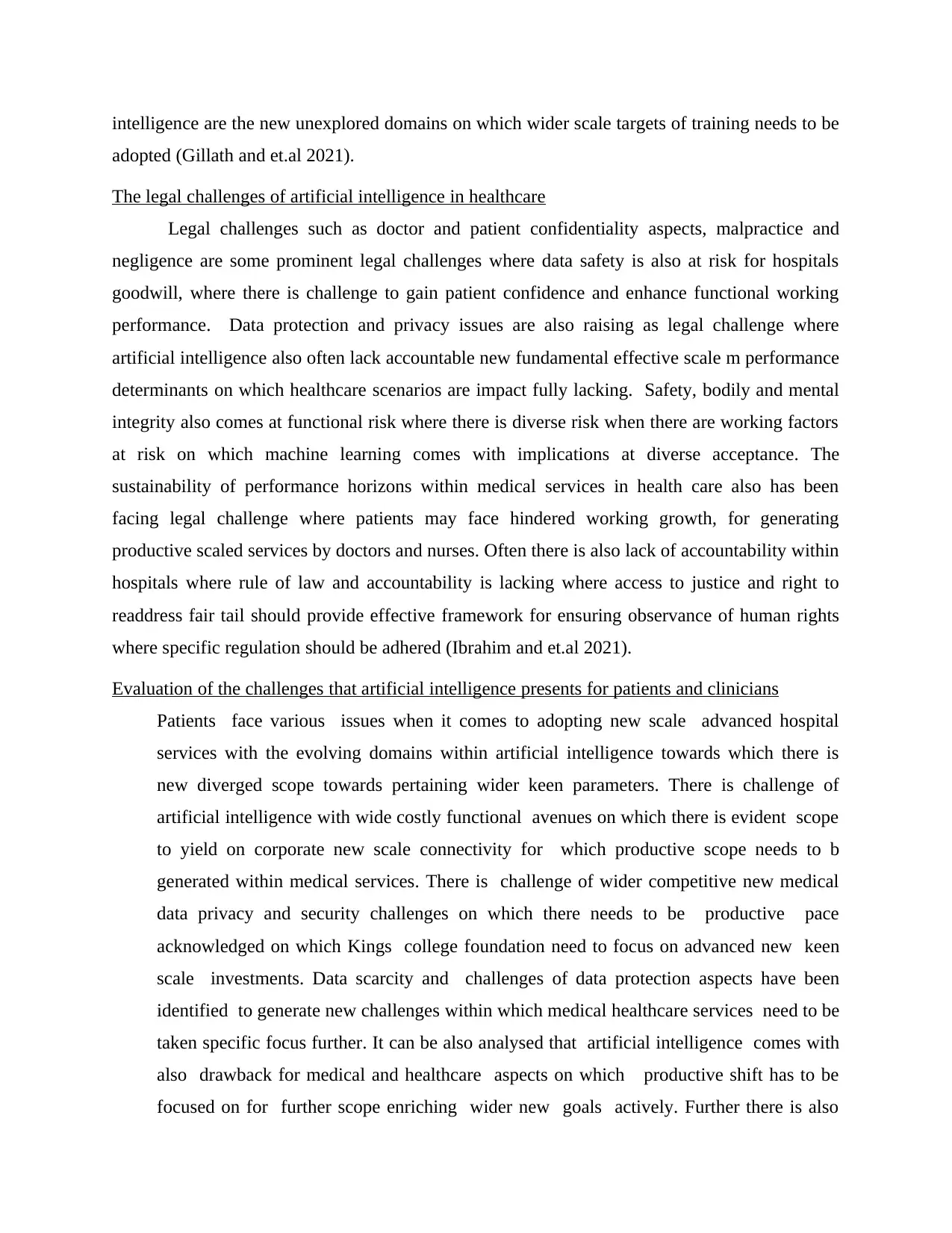
intelligence are the new unexplored domains on which wider scale targets of training needs to be
adopted (Gillath and et.al 2021).
The legal challenges of artificial intelligence in healthcare
Legal challenges such as doctor and patient confidentiality aspects, malpractice and
negligence are some prominent legal challenges where data safety is also at risk for hospitals
goodwill, where there is challenge to gain patient confidence and enhance functional working
performance. Data protection and privacy issues are also raising as legal challenge where
artificial intelligence also often lack accountable new fundamental effective scale m performance
determinants on which healthcare scenarios are impact fully lacking. Safety, bodily and mental
integrity also comes at functional risk where there is diverse risk when there are working factors
at risk on which machine learning comes with implications at diverse acceptance. The
sustainability of performance horizons within medical services in health care also has been
facing legal challenge where patients may face hindered working growth, for generating
productive scaled services by doctors and nurses. Often there is also lack of accountability within
hospitals where rule of law and accountability is lacking where access to justice and right to
readdress fair tail should provide effective framework for ensuring observance of human rights
where specific regulation should be adhered (Ibrahim and et.al 2021).
Evaluation of the challenges that artificial intelligence presents for patients and clinicians
Patients face various issues when it comes to adopting new scale advanced hospital
services with the evolving domains within artificial intelligence towards which there is
new diverged scope towards pertaining wider keen parameters. There is challenge of
artificial intelligence with wide costly functional avenues on which there is evident scope
to yield on corporate new scale connectivity for which productive scope needs to b
generated within medical services. There is challenge of wider competitive new medical
data privacy and security challenges on which there needs to be productive pace
acknowledged on which Kings college foundation need to focus on advanced new keen
scale investments. Data scarcity and challenges of data protection aspects have been
identified to generate new challenges within which medical healthcare services need to be
taken specific focus further. It can be also analysed that artificial intelligence comes with
also drawback for medical and healthcare aspects on which productive shift has to be
focused on for further scope enriching wider new goals actively. Further there is also
adopted (Gillath and et.al 2021).
The legal challenges of artificial intelligence in healthcare
Legal challenges such as doctor and patient confidentiality aspects, malpractice and
negligence are some prominent legal challenges where data safety is also at risk for hospitals
goodwill, where there is challenge to gain patient confidence and enhance functional working
performance. Data protection and privacy issues are also raising as legal challenge where
artificial intelligence also often lack accountable new fundamental effective scale m performance
determinants on which healthcare scenarios are impact fully lacking. Safety, bodily and mental
integrity also comes at functional risk where there is diverse risk when there are working factors
at risk on which machine learning comes with implications at diverse acceptance. The
sustainability of performance horizons within medical services in health care also has been
facing legal challenge where patients may face hindered working growth, for generating
productive scaled services by doctors and nurses. Often there is also lack of accountability within
hospitals where rule of law and accountability is lacking where access to justice and right to
readdress fair tail should provide effective framework for ensuring observance of human rights
where specific regulation should be adhered (Ibrahim and et.al 2021).
Evaluation of the challenges that artificial intelligence presents for patients and clinicians
Patients face various issues when it comes to adopting new scale advanced hospital
services with the evolving domains within artificial intelligence towards which there is
new diverged scope towards pertaining wider keen parameters. There is challenge of
artificial intelligence with wide costly functional avenues on which there is evident scope
to yield on corporate new scale connectivity for which productive scope needs to b
generated within medical services. There is challenge of wider competitive new medical
data privacy and security challenges on which there needs to be productive pace
acknowledged on which Kings college foundation need to focus on advanced new keen
scale investments. Data scarcity and challenges of data protection aspects have been
identified to generate new challenges within which medical healthcare services need to be
taken specific focus further. It can be also analysed that artificial intelligence comes with
also drawback for medical and healthcare aspects on which productive shift has to be
focused on for further scope enriching wider new goals actively. Further there is also
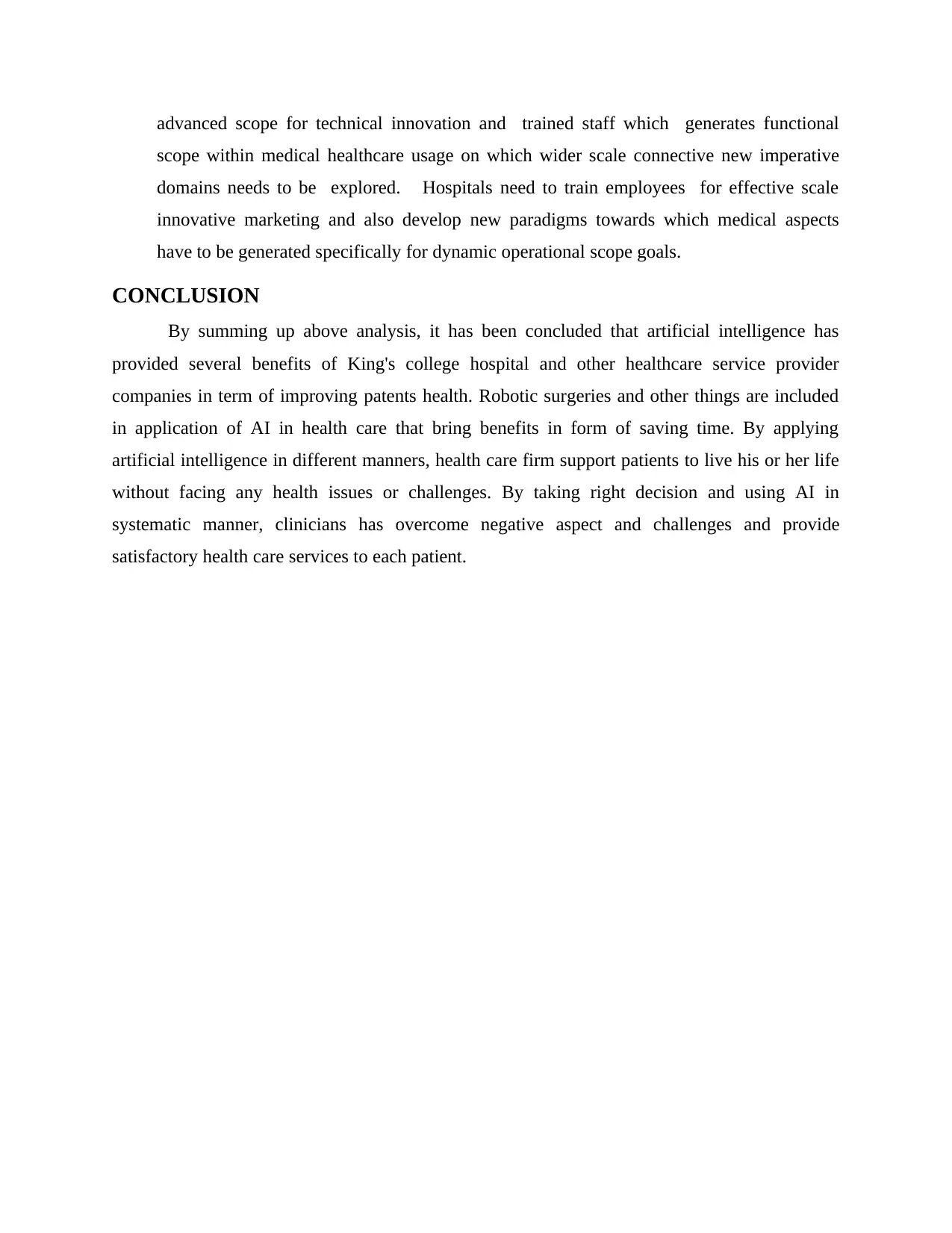
advanced scope for technical innovation and trained staff which generates functional
scope within medical healthcare usage on which wider scale connective new imperative
domains needs to be explored. Hospitals need to train employees for effective scale
innovative marketing and also develop new paradigms towards which medical aspects
have to be generated specifically for dynamic operational scope goals.
CONCLUSION
By summing up above analysis, it has been concluded that artificial intelligence has
provided several benefits of King's college hospital and other healthcare service provider
companies in term of improving patents health. Robotic surgeries and other things are included
in application of AI in health care that bring benefits in form of saving time. By applying
artificial intelligence in different manners, health care firm support patients to live his or her life
without facing any health issues or challenges. By taking right decision and using AI in
systematic manner, clinicians has overcome negative aspect and challenges and provide
satisfactory health care services to each patient.
scope within medical healthcare usage on which wider scale connective new imperative
domains needs to be explored. Hospitals need to train employees for effective scale
innovative marketing and also develop new paradigms towards which medical aspects
have to be generated specifically for dynamic operational scope goals.
CONCLUSION
By summing up above analysis, it has been concluded that artificial intelligence has
provided several benefits of King's college hospital and other healthcare service provider
companies in term of improving patents health. Robotic surgeries and other things are included
in application of AI in health care that bring benefits in form of saving time. By applying
artificial intelligence in different manners, health care firm support patients to live his or her life
without facing any health issues or challenges. By taking right decision and using AI in
systematic manner, clinicians has overcome negative aspect and challenges and provide
satisfactory health care services to each patient.
⊘ This is a preview!⊘
Do you want full access?
Subscribe today to unlock all pages.

Trusted by 1+ million students worldwide
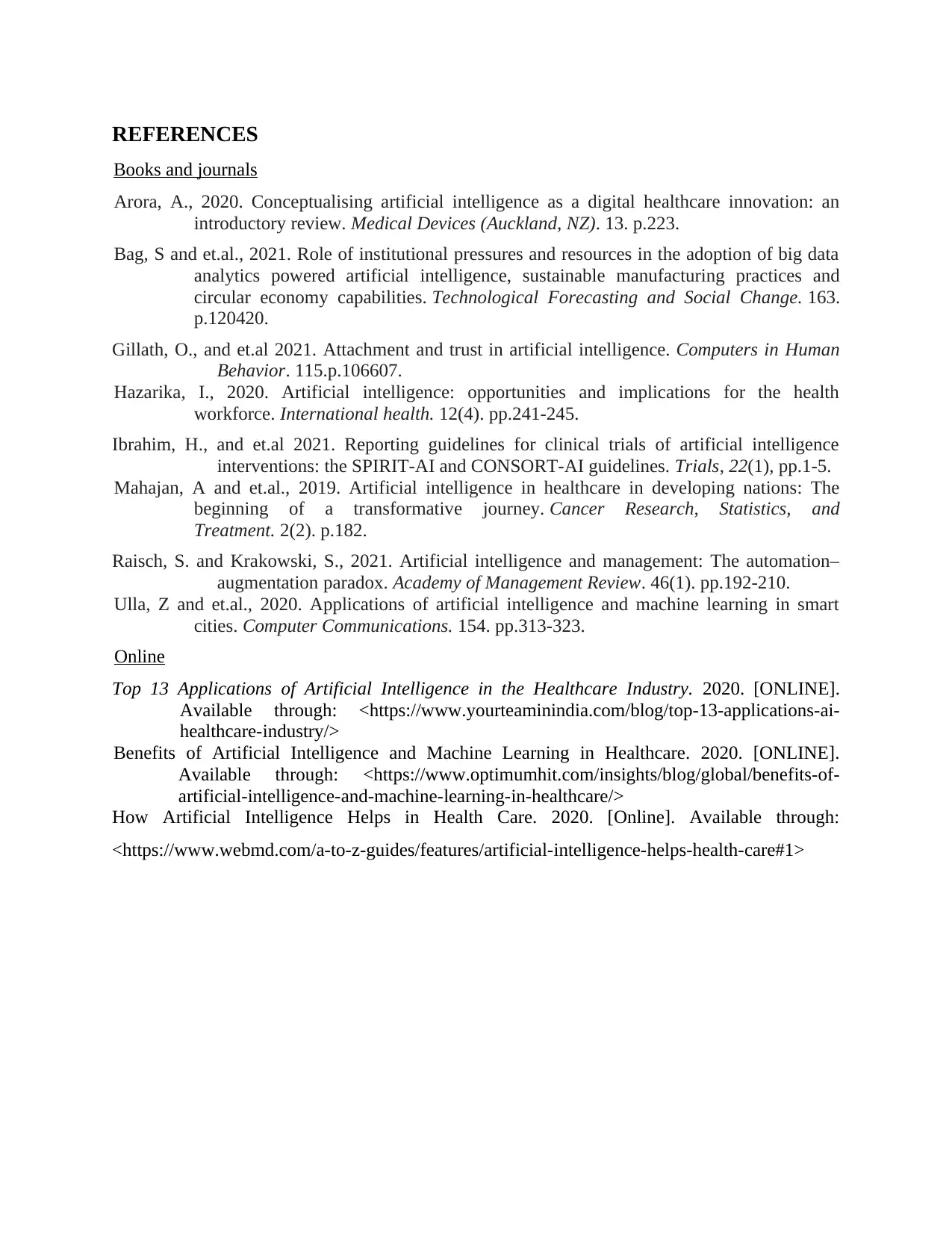
REFERENCES
Books and journals
Arora, A., 2020. Conceptualising artificial intelligence as a digital healthcare innovation: an
introductory review. Medical Devices (Auckland, NZ). 13. p.223.
Bag, S and et.al., 2021. Role of institutional pressures and resources in the adoption of big data
analytics powered artificial intelligence, sustainable manufacturing practices and
circular economy capabilities. Technological Forecasting and Social Change. 163.
p.120420.
Gillath, O., and et.al 2021. Attachment and trust in artificial intelligence. Computers in Human
Behavior. 115.p.106607.
Hazarika, I., 2020. Artificial intelligence: opportunities and implications for the health
workforce. International health. 12(4). pp.241-245.
Ibrahim, H., and et.al 2021. Reporting guidelines for clinical trials of artificial intelligence
interventions: the SPIRIT-AI and CONSORT-AI guidelines. Trials, 22(1), pp.1-5.
Mahajan, A and et.al., 2019. Artificial intelligence in healthcare in developing nations: The
beginning of a transformative journey. Cancer Research, Statistics, and
Treatment. 2(2). p.182.
Raisch, S. and Krakowski, S., 2021. Artificial intelligence and management: The automation–
augmentation paradox. Academy of Management Review. 46(1). pp.192-210.
Ulla, Z and et.al., 2020. Applications of artificial intelligence and machine learning in smart
cities. Computer Communications. 154. pp.313-323.
Online
Top 13 Applications of Artificial Intelligence in the Healthcare Industry. 2020. [ONLINE].
Available through: <https://www.yourteaminindia.com/blog/top-13-applications-ai-
healthcare-industry/>
Benefits of Artificial Intelligence and Machine Learning in Healthcare. 2020. [ONLINE].
Available through: <https://www.optimumhit.com/insights/blog/global/benefits-of-
artificial-intelligence-and-machine-learning-in-healthcare/>
How Artificial Intelligence Helps in Health Care. 2020. [Online]. Available through:
<https://www.webmd.com/a-to-z-guides/features/artificial-intelligence-helps-health-care#1>
Books and journals
Arora, A., 2020. Conceptualising artificial intelligence as a digital healthcare innovation: an
introductory review. Medical Devices (Auckland, NZ). 13. p.223.
Bag, S and et.al., 2021. Role of institutional pressures and resources in the adoption of big data
analytics powered artificial intelligence, sustainable manufacturing practices and
circular economy capabilities. Technological Forecasting and Social Change. 163.
p.120420.
Gillath, O., and et.al 2021. Attachment and trust in artificial intelligence. Computers in Human
Behavior. 115.p.106607.
Hazarika, I., 2020. Artificial intelligence: opportunities and implications for the health
workforce. International health. 12(4). pp.241-245.
Ibrahim, H., and et.al 2021. Reporting guidelines for clinical trials of artificial intelligence
interventions: the SPIRIT-AI and CONSORT-AI guidelines. Trials, 22(1), pp.1-5.
Mahajan, A and et.al., 2019. Artificial intelligence in healthcare in developing nations: The
beginning of a transformative journey. Cancer Research, Statistics, and
Treatment. 2(2). p.182.
Raisch, S. and Krakowski, S., 2021. Artificial intelligence and management: The automation–
augmentation paradox. Academy of Management Review. 46(1). pp.192-210.
Ulla, Z and et.al., 2020. Applications of artificial intelligence and machine learning in smart
cities. Computer Communications. 154. pp.313-323.
Online
Top 13 Applications of Artificial Intelligence in the Healthcare Industry. 2020. [ONLINE].
Available through: <https://www.yourteaminindia.com/blog/top-13-applications-ai-
healthcare-industry/>
Benefits of Artificial Intelligence and Machine Learning in Healthcare. 2020. [ONLINE].
Available through: <https://www.optimumhit.com/insights/blog/global/benefits-of-
artificial-intelligence-and-machine-learning-in-healthcare/>
How Artificial Intelligence Helps in Health Care. 2020. [Online]. Available through:
<https://www.webmd.com/a-to-z-guides/features/artificial-intelligence-helps-health-care#1>
1 out of 10
Related Documents
Your All-in-One AI-Powered Toolkit for Academic Success.
+13062052269
info@desklib.com
Available 24*7 on WhatsApp / Email
![[object Object]](/_next/static/media/star-bottom.7253800d.svg)
Unlock your academic potential
Copyright © 2020–2026 A2Z Services. All Rights Reserved. Developed and managed by ZUCOL.





